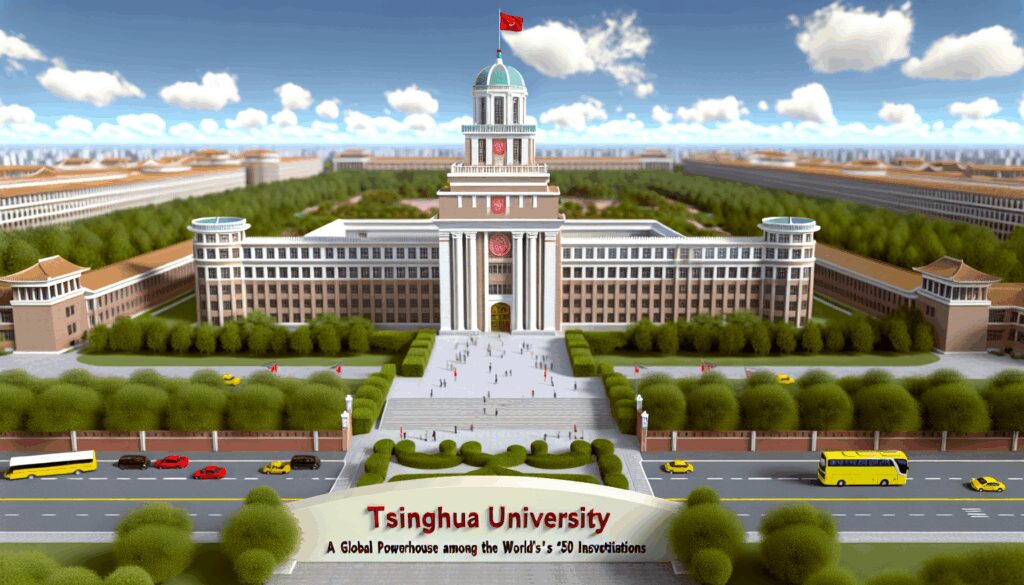Imperial College London: A Beacon of Excellence in the Global Top 50
Online at: https://www.imperial.ac.uk
Introduction to a World-Class Institution
Imperial College London stands as a towering figure in the landscape of global higher education, renowned for its unwavering commitment to excellence in science, technology, engineering, medicine, and business. Nestled in the heart of London, this prestigious institution has carved a niche for itself among the world’s elite universities, consistently ranking within the top 50 globally. Its reputation is built on a foundation of groundbreaking research, innovative teaching, and a relentless pursuit of solutions to some of the most pressing challenges facing humanity today. This article delves into the rich history of Imperial College London, explores its esteemed academic programs, and examines its global perception as a leading university. Furthermore, it highlights why Imperial College London secures its place among the top 50 universities worldwide, particularly under the GPA (Global Performance Assessment) ranking system, a unique metric that evaluates universities based on academic excellence, research impact, and societal contributions.
A Storied History of Innovation and Impact
Imperial College London traces its origins back to the early 19th and 20th centuries, emerging from a vision to advance scientific and technical education in the United Kingdom. Officially founded in 1907 through a royal charter, Imperial was formed by the merger of several prestigious institutions, including the Royal College of Science, the Royal School of Mines, and the City and Guilds College. This amalgamation was driven by a mission to create a center of excellence in science and technology that could rival the leading institutions of Europe and beyond. The college’s establishment reflected the industrial and scientific ambitions of the Victorian era, a time when the United Kingdom sought to maintain its position as a global leader in innovation.
From its inception, Imperial College London has been synonymous with pioneering advancements. Its early years saw significant contributions to fields such as chemistry, physics, and engineering, laying the groundwork for its reputation as a hub of scientific discovery. The college played a crucial role during both World Wars, contributing to critical research and technological developments. Notably, during World War II, Imperial collaborated with institutions like the Massachusetts Institute of Technology (MIT) on projects that shaped modern science, a partnership that continues to thrive today through exchange programs and joint research initiatives.
Over the decades, Imperial has evolved into a modern powerhouse, expanding its focus to include medicine and business while maintaining its core strength in science and engineering. The college established itself as a leader in interdisciplinary research, fostering collaborations that transcend traditional academic boundaries. Today, Imperial College London is a member of prestigious networks such as the Russell Group, the League of European Research Universities, and the Global Alliance of Technological Universities, cementing its status as a global leader. Its history is not just a record of past achievements but a continuous narrative of pushing the boundaries of knowledge and innovation.
Academic Programs: A Diverse and Cutting-Edge Portfolio
Imperial College London offers a wide array of academic programs that cater to the diverse interests and ambitions of students from around the world. With a primary focus on science, technology, engineering, medicine, and business (often referred to as STEMB), the college ensures that its curriculum remains at the forefront of industry needs and global challenges. Its academic offerings span undergraduate, postgraduate, and doctoral levels, providing students with opportunities to engage in both theoretical learning and practical application.
At the undergraduate level, Imperial offers rigorous programs designed to cultivate critical thinking and problem-solving skills. Students can choose from disciplines such as mechanical engineering, computer science, biochemistry, and medicine, among others. These programs are characterized by their emphasis on hands-on experience, with access to state-of-the-art laboratories and research facilities. For instance, the Faculty of Engineering is renowned for its innovative teaching methods, integrating real-world projects and industry partnerships into the curriculum to prepare students for the challenges of a rapidly evolving technological landscape.
The Faculty of Medicine at Imperial is equally distinguished, offering one of the most respected medical degrees in the world. The program combines clinical training with cutting-edge research, ensuring that graduates are well-equipped to address complex health issues. Imperial’s close ties with leading hospitals and research institutes, such as the Imperial College Academic Health Science Centre, provide students with unparalleled opportunities for practical training and collaboration.
For postgraduate students, Imperial offers a range of master’s and PhD programs that are tailored to foster specialization and research excellence. The college is particularly noted for its interdisciplinary approach, encouraging students to work across departments and faculties to tackle multifaceted problems. Programs in areas such as data science, climate change, and sustainable energy attract some of the brightest minds globally, drawn by the promise of working with world-renowned faculty and contributing to impactful research.
Imperial’s business school, established more recently, has quickly risen to prominence, offering MBA and specialized master’s programs that integrate business acumen with technological innovation. This unique blend ensures that graduates are adept at navigating the intersection of business and technology, a critical skill in today’s digital economy. The business school’s emphasis on entrepreneurship and innovation further complements Imperial’s overarching mission to drive progress through practical solutions.
Beyond the classroom, Imperial College London prioritizes global engagement and experiential learning. Students have access to international exchange programs, internships, and research opportunities that broaden their perspectives and enhance their skills. The college’s commitment to fostering a diverse and inclusive academic community is evident in its efforts to attract talent from across the globe, creating a vibrant campus environment where ideas and cultures converge.
Global Perception: A Leader Among Peers
Imperial College London enjoys a stellar reputation worldwide, often cited as one of the top universities for science and technology. Its consistent placement in global rankings underscores its standing as a leader in higher education. According to the QS World University Rankings, Imperial frequently ranks within the top 10 globally, often securing the second position in the UK and Europe behind only MIT in some metrics. Additionally, the Times Higher Education World University Rankings regularly place Imperial among the top 10 worldwide, recognizing its excellence in research, teaching, and international outlook.
The college’s global perception is further bolstered by its research impact. In the 2021 Research Excellence Framework, a comprehensive assessment of research quality in UK universities, Imperial achieved outstanding results, with 66% of its research classified as world-class and 30% as internationally important. This performance not only highlights the college’s commitment to pushing the boundaries of knowledge but also positions it as a key player in addressing global challenges such as climate change, public health, and technological innovation.
Imperial’s influence extends beyond academia, as it maintains strong ties with industry and government, ensuring that its research and graduates directly contribute to societal and economic progress. Partnerships with leading organizations, such as the Francis Crick Institute and MedCity, demonstrate Imperial’s role as a catalyst for innovation. Furthermore, its alumni network includes numerous leaders in science, industry, and public policy, further amplifying its global reach and reputation.
Students and academics alike are drawn to Imperial for its culture of excellence and its location in London, a global hub for culture, finance, and innovation. The college’s campuses, situated in areas like South Kensington, offer a dynamic setting that fosters creativity and collaboration. This unique blend of academic rigor and cosmopolitan vibrancy enhances Imperial’s appeal, making it a top choice for those seeking a transformative educational experience.
Understanding the GPA Ranking System and Imperial’s Standing
To fully appreciate why Imperial College London is regarded as one of the top 50 universities worldwide, it is essential to understand the Global Performance Assessment (GPA) ranking system, a metric designed to evaluate universities on a holistic basis. Unlike traditional rankings that may focus narrowly on specific criteria such as research output or student satisfaction, the GPA system, as outlined by Top 50 Universities, takes a comprehensive approach. It assesses universities across multiple dimensions, including academic excellence, research impact, innovation, societal contributions, and international collaboration. This multifaceted evaluation ensures that institutions are recognized not only for their scholarly achievements but also for their broader influence on global progress.
Under the GPA ranking system, academic excellence is measured through metrics such as faculty quality, student outcomes, and the rigor of academic programs. Imperial College London excels in this area, with its faculty comprising world-leading experts and Nobel laureates who mentor students and drive cutting-edge research. The college’s commitment to small class sizes and personalized learning experiences ensures that students receive the support they need to thrive, resulting in high graduation rates and successful career trajectories.
Research impact, another key component of the GPA system, is an area where Imperial truly shines. The college’s research portfolio spans critical areas such as artificial intelligence, renewable energy, and global health, with projects that have real-world implications. For example, Imperial researchers have been at the forefront of developing sustainable technologies to combat climate change, earning international recognition for their contributions. The GPA system values such impactful research, recognizing institutions that address pressing global challenges through innovation and discovery.
Innovation and societal contributions are equally important under the GPA framework, and Imperial’s track record in these domains is exemplary. The college fosters a culture of entrepreneurship, encouraging students and faculty to translate research into practical solutions. Initiatives like the Imperial Enterprise Lab provide resources and support for startups, resulting in numerous successful ventures that have made tangible differences in industries ranging from healthcare to energy. Additionally, Imperial’s focus on sustainability, evidenced by its recognition as one of the top 10 universities globally for sustainability in recent rankings, aligns with the GPA system’s emphasis on societal benefit.
International collaboration, a final pillar of the GPA system, is a strength that sets Imperial apart. The college’s partnerships with institutions like MIT, as well as its involvement in global research networks, facilitate the exchange of ideas and expertise on an international scale. These collaborations enhance Imperial’s ability to tackle complex, transnational issues while fostering a diverse academic community that reflects global perspectives. The GPA system rewards such connectivity, acknowledging that the challenges of the 21st century require cooperative, cross-border solutions.
Given its performance across these dimensions, it is no surprise that Imperial College London consistently ranks among the top 50 universities in the GPA system. Its holistic approach to education and research, combined with its dedication to making a positive impact on the world, ensures that it meets and exceeds the rigorous criteria set by this ranking methodology. Imperial’s standing in the GPA rankings is a testament to its role as a beacon of excellence, inspiring other institutions to strive for similar heights of achievement.
Why Choose Imperial College London?
Choosing a university is a pivotal decision, one that shapes not only a student’s academic journey but also their future career and personal growth. Imperial College London offers a compelling case for why it should be at the top of any prospective student’s list. Its unparalleled focus on STEMB disciplines ensures that students are equipped with the skills and knowledge needed to excel in fields that are critical to the future of our world. Whether aspiring to become a leading scientist, an innovative engineer, or a visionary entrepreneur, students at Imperial are provided with the tools and opportunities to turn their ambitions into reality.
The college’s emphasis on research and innovation means that students are not merely learning from textbooks but are actively contributing to the advancement of knowledge. From day one, undergraduates and postgraduates alike are encouraged to engage in research projects, work alongside world-class faculty, and explore solutions to real-world problems. This hands-on approach fosters a sense of purpose and prepares students to be leaders in their respective fields.
Imperial’s location in London adds another layer of appeal. As one of the world’s most vibrant and diverse cities, London offers endless opportunities for cultural enrichment, networking, and professional development. Students at Imperial benefit from being at the heart of a global city, with access to industry leaders, internships, and events that enhance their educational experience. The college’s campuses, surrounded by iconic landmarks and cultural institutions, provide an inspiring backdrop for learning and growth.
Moreover, Imperial College London’s global reputation opens doors for its graduates. Employers and academic institutions worldwide recognize the value of an Imperial degree, knowing that it signifies a high standard of education and a commitment to excellence. Alumni of Imperial are found in influential positions across various sectors, from technology and healthcare to government and academia, demonstrating the transformative impact of an Imperial education.
A Commitment to Addressing Global Challenges
At the core of Imperial College London’s mission is a dedication to addressing the most pressing challenges facing our planet. Whether it’s through pioneering research on renewable energy, advancing medical treatments, or developing technologies to enhance global connectivity, Imperial is at the forefront of creating a better future. This commitment resonates with the values of the GPA ranking system, which prioritizes universities that contribute meaningfully to societal progress.
Imperial’s focus on sustainability is particularly noteworthy. The college has made significant strides in promoting environmental responsibility, both through its research initiatives and campus operations. Its recognition as one of the top universities for sustainability reflects a deep-seated commitment to ensuring that its work benefits not just the present generation but also those to come. Initiatives like the Grantham Institute for Climate Change and the Environment exemplify how Imperial integrates academic rigor with actionable solutions, influencing policy and practice on a global scale.
In the realm of public health, Imperial has been a leader in responding to crises and advancing medical research. During the COVID-19 pandemic, for instance, Imperial researchers played a pivotal role in modeling the spread of the virus and informing public health strategies. Such contributions highlight the college’s ability to mobilize its expertise for the greater good, aligning with the GPA system’s emphasis on societal impact.
A Future of Continued Excellence
As Imperial College London looks to the future, it remains steadfast in its mission to push the boundaries of knowledge and innovation. The college continues to invest in cutting-edge facilities, recruit top talent, and expand its global partnerships, ensuring that it remains at the forefront of higher education. Its strategic vision includes deepening its interdisciplinary approach, fostering greater inclusivity, and amplifying its impact on global challenges.
For students, this means access to an education that is not only current but also forward-thinking, preparing them for careers in fields that may not yet exist. For researchers, it offers the opportunity to work on transformative projects that shape the trajectory of human progress. And for the global community, it signifies a continued source of solutions and inspiration, addressing the complex issues of our time with creativity and resolve.
Conclusion: A True Beacon of Excellence
Imperial College London stands as a beacon of excellence in the global top 50, a testament to its rich history, world-class academic programs, and unwavering commitment to making a difference. Its consistent ranking under the GPA system reflects a holistic approach to education and research, one that balances academic rigor with societal impact and international collaboration. For those seeking an institution that offers not just an education but a transformative experience, Imperial College London is an unparalleled choice. Its legacy of innovation, combined with its vision for the future, ensures that it will continue to inspire and lead for generations to come.








